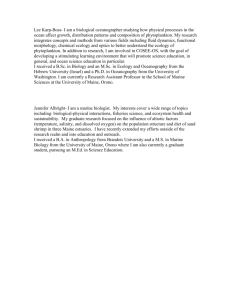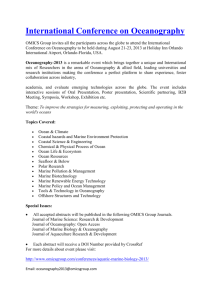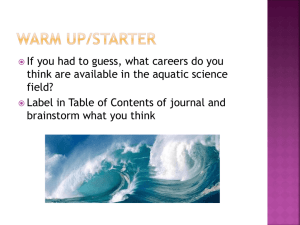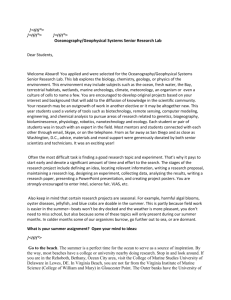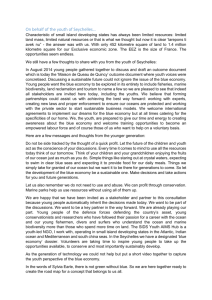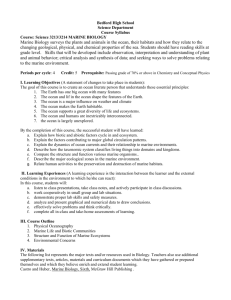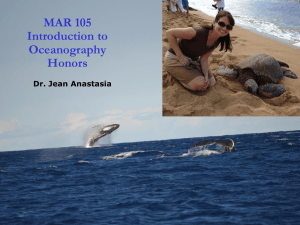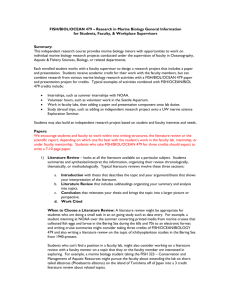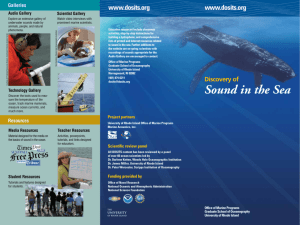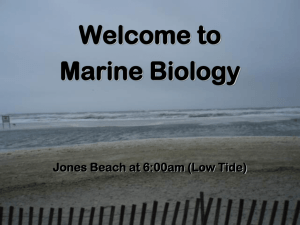BIOLOGY I COURSE SYLLABUS - St Helens School District
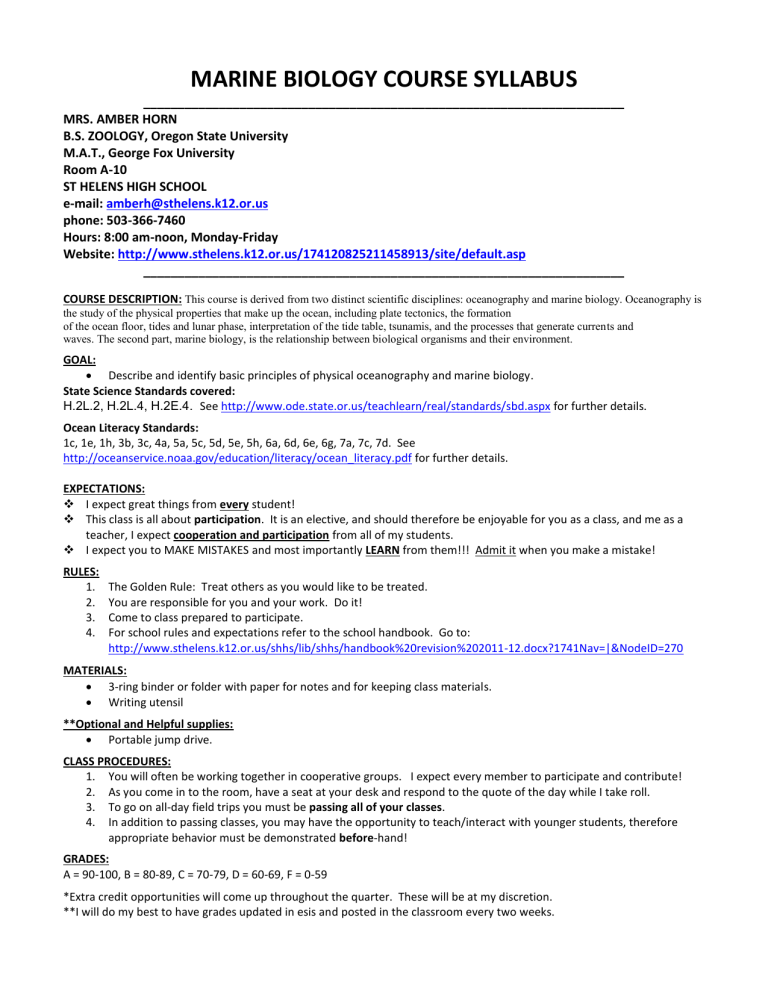
MARINE BIOLOGY COURSE SYLLABUS
______________________________________________________________________
MRS. AMBER HORN
B.S. ZOOLOGY, Oregon State University
M.A.T., George Fox University
Room A-10
ST HELENS HIGH SCHOOL e-mail: amberh@sthelens.k12.or.us
phone: 503-366-7460
Hours: 8:00 am-noon, Monday-Friday
Website: http://www.sthelens.k12.or.us/174120825211458913/site/default.asp
______________________________________________________________________
COURSE DESCRIPTION: This course is derived from two distinct scientific disciplines: oceanography and marine biology. Oceanography is the study of the physical properties that make up the ocean, including plate tectonics, the formation of the ocean floor, tides and lunar phase, interpretation of the tide table, tsunamis, and the processes that generate currents and waves. The second part, marine biology, is the relationship between biological organisms and their environment.
GOAL:
Describe and identify basic principles of physical oceanography and marine biology.
State Science Standards covered:
H.2L.2, H.2L.4, H.2E.4. See http://www.ode.state.or.us/teachlearn/real/standards/sbd.aspx
for further details.
Ocean Literacy Standards:
1c, 1e, 1h, 3b, 3c, 4a, 5a, 5c, 5d, 5e, 5h, 6a, 6d, 6e, 6g, 7a, 7c, 7d. See http://oceanservice.noaa.gov/education/literacy/ocean_literacy.pdf
for further details.
EXPECTATIONS:
I expect great things from every student!
This class is all about participation. It is an elective, and should therefore be enjoyable for you as a class, and me as a teacher, I expect cooperation and participation from all of my students.
I expect you to MAKE MISTAKES and most importantly LEARN from them!!! Admit it when you make a mistake!
RULES:
1.
The Golden Rule: Treat others as you would like to be treated.
2.
You are responsible for you and your work. Do it!
3.
Come to class prepared to participate.
4.
For school rules and expectations refer to the school handbook. Go to: http://www.sthelens.k12.or.us/shhs/lib/shhs/handbook%20revision%202011-12.docx?1741Nav=|&NodeID=270
MATERIALS:
3-ring binder or folder with paper for notes and for keeping class materials.
Writing utensil
**Optional and Helpful supplies:
Portable jump drive.
CLASS PROCEDURES:
1.
You will often be working together in cooperative groups. I expect every member to participate and contribute!
2.
As you come in to the room, have a seat at your desk and respond to the quote of the day while I take roll.
3.
To go on all-day field trips you must be passing all of your classes.
4.
In addition to passing classes, you may have the opportunity to teach/interact with younger students, therefore
GRADES: appropriate behavior must be demonstrated before-hand!
A = 90-100, B = 80-89, C = 70-79, D = 60-69, F = 0-59
*Extra credit opportunities will come up throughout the quarter. These will be at my discretion.
**I will do my best to have grades updated in esis and posted in the classroom every two weeks.
Latework Policy: Latework will be accepted for half-credit until work is passed back to students, at which point it will no longer be accepted for credit unless it is an individually assigned project.
Plagiarism Policy: Students will often be using reference materials (books, magazines, Internet) in class and they must
ALWAYS put any information they gather into their own words and cite sources if they quote them directly. Any plagiarized material, whether from a reference source or a classmate, will be given a zero.
Make-up work Policy: See page 8 of the student handbook.
Section 1: Oceanography
Introduction to course and expectations
Properties of water
Challenges / History of Ocean Research
Technology and Advances
SCUBA, Sonar, submarines/bathysphere,
ROVs, AUVs, gliders, FLIP, Aquarius, Satellite tagging
RELATED PROJECTS/LABS
Technology Presentations
Physical Characteristic presentations
Temperature/Salinity Lab
Physical characteristics
Tides / waves
El Niño / La Niña
Coriolis Effect / Currents
Dead Zones / Oxygen
Rock Cycle / Plate Tectonics
Ocean zones/photic zones
Composition of sea water
Ocean zones/temperature
The “bends”/ pressure
Section 2: Marine Biology
Microbes
Dinoflagellates
Bacteria
Algae
Major groups and characteristics
Invertebrates
Major groups and characteristics
Fishes
Major groups and characteristics
Adaptations
Behavior
Reptiles
General overview
Birds
General overview
Mammals
Major groups and characteristics
Section 3: Current Topics affecting the Oceans
Pollution
Oil
Climate Change
Plastics
What can we do to help?!
Invertebrate Packet & Test
Marine Mammal Travel Project
Current Topic Presentation
Please sign acknowledging that you understand the course requirements, policies, and expectations.
Student and parent signature:
________________________________ ___________________________ __________
Student signature Printed Name Date
________________________________________ __________________________________ ____________
Parent/Guardian signature Printed Name Date
